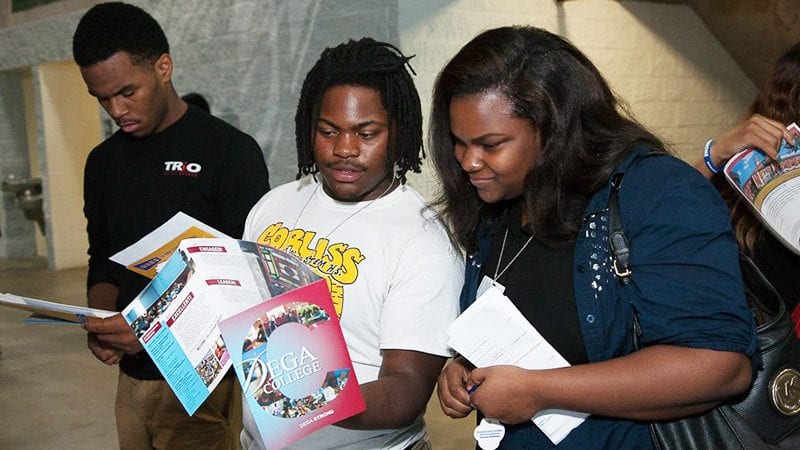The Journey to a Successful HBCU Experience Begins Now

This article was published in the January 2019 issue of HBCU Times
Most HBCU [historically black colleges and universities] alums would agree that their college experience was probably the best times of their lives. We have all heard stories on how one school’s team, campus, homecoming, etc. is better than the other; or stories on how alumni’s remarkable work has had such a profound impact on future generations of students. When I was an undergraduate student at Morehouse College, I remember being inspired each time I walked past the famous statue of Dr. Martin Luther King, Jr. We also know how important a college education is to earning potential over a lifetime. We’ve read the statistics from the US Bureau of Labor Statistics or UNCF’s Frederick D. Patterson Research Institute, where HBCU alums are likely to earn greater than 60% more than their counterparts who do not have a bachelor’s degree. Undoubtedly, a college degree prepares you for transition into your career field. But what about the years before going to college?
In the years before college, whether the course was an elective or required, the education you received should have been the foundation of the courses you enroll in in higher education. We all know that! Having graduated from DC Public Schools, I’m extremely lucky to have received a quality education that more than prepared me for my Morehouse College education. But what happens if the education you receive doesn’t match the high quality education needed to do well in higher education? Because some current K-12 education lacks rigorous curriculum, subjects that should be covered—simply aren’t. This results in African American students not being fully equipped for college-level coursework. Oftentimes, our children enter HBCUs having to take remedial math, English or both, just to catch up. As you can imagine, taking courses in college that should have been taken in high school wastes valuable time, energy and money. In 2016, US students and families spent $1.3 billion in remedial courses. Not to mention, some low-income African American students don’t have an early exposure to highly demanding science, technology, engineering, and mathematics courses to prepare them for STEM careers.
What happens if the education you receive doesn’t match the high quality education needed to do well in higher education?
While UNCF strongly supports the education of black students in college, we also strongly support the path to college—ensuring students are fully prepared for college success. And that starts in their K-12 education, including expanded educational options such as magnet and charter schools. The UNCF K-12 Advocacy department believes that if students are academically prepared for college, we can radically change the story of what’s possible.
In addition to school choice, we must challenge the deficit narrative about the educational aspirations of low-income African American youth who want to go to college. While substantial racial inequalities exist, we have to protect our children from becoming discouraged or disengaged with education. Such negative narratives hinder college aspirations. One way of challenging this narrative is through diversifying the teacher workforce. In other words: “representation matters.” A recent study released by Johns Hopkins University highlights a key factor that UNCF has been saying for years now—black students in K-12 education who have just one black teacher are 13% more likely to go to college. However only 18% of all public school teachers are teachers of color.
But how do we change the current K-12 education system in America? How do we ensure our children are prepared to succeed when it’s time for them to attend an HBCU or other college? We hold our schools and teachers accountable for providing high-quality education. We work on diversity and inclusion at the teacher and school administration levels. We promote college-readiness environments in our homes, communities and schools. We support HBCUs partnering with local K-12 education systems that provide professional development training to prospective teachers or college credits to high school students. We support organizations like UNCF, Stand for Children or other groups working to advocate for improved and equal education standards. As for what an individual can do, starting the conversation is paramount to engaging your local community. UNCF’s K-12 Advocacy department also suggests you:
- Learn about important education reform terms, issues and facts.
- Access your local community and create opportunities to hear from key stakeholders.
- Launch a social media campaign advocating for change in education.
Parents: Understanding the standards at your child’s school may be difficult. Supporting your children throughout their K-12 journey, however is essential. Check out the parent checklist at UNCF.org/ParentChecklist for key questions when approaching your child’s teachers and other school administrators about your child’s educational development.
Lawmakers: Don’t neglect high quality education or education reform. Education reform shouldn’t only impact high-income communities. It’s time to build a better narrative in the education of black students and other students of color by charting a new path in education reform. Create equitable education policy solutions that emphasize a college readiness atmosphere.
Starting the conversation is paramount to engaging your local community.
UNCF’s report A Seat at the Table: African American Youth’s Perceptions of K-12 Education examines the perspectives from African American youth on their thoughts about education reform, their education priorities, barriers to achievement and ideas on how to improve their K-12 education experiences so that they are better equipped for college. It’s time that we as a community not only advocate for our children attending college, but also that their journey to college gives them the knowledge, skills, and tools they need to succeed at the university level.
Meaningful change will not happen unless there are policy advocates—like you—who are unapologetic in your endeavors. Are you, as change-makers, ready to act on what students say they need in order to succeed in college? Let’s bridge this opportunity gap and invest in innovative programs that provide broader financial literacy programs for K-12 students, college counseling and federal financial aid advising.
 Sekou Biddle, UNCF’s Vice President, Advocacy, leads UNCF’s advocacy efforts to ensure more African American students will be college-ready and better prepared to enroll in and complete college by driving sustainable education reforms that benefit students and empower parents and communities to demand improvement.
Sekou Biddle, UNCF’s Vice President, Advocacy, leads UNCF’s advocacy efforts to ensure more African American students will be college-ready and better prepared to enroll in and complete college by driving sustainable education reforms that benefit students and empower parents and communities to demand improvement.